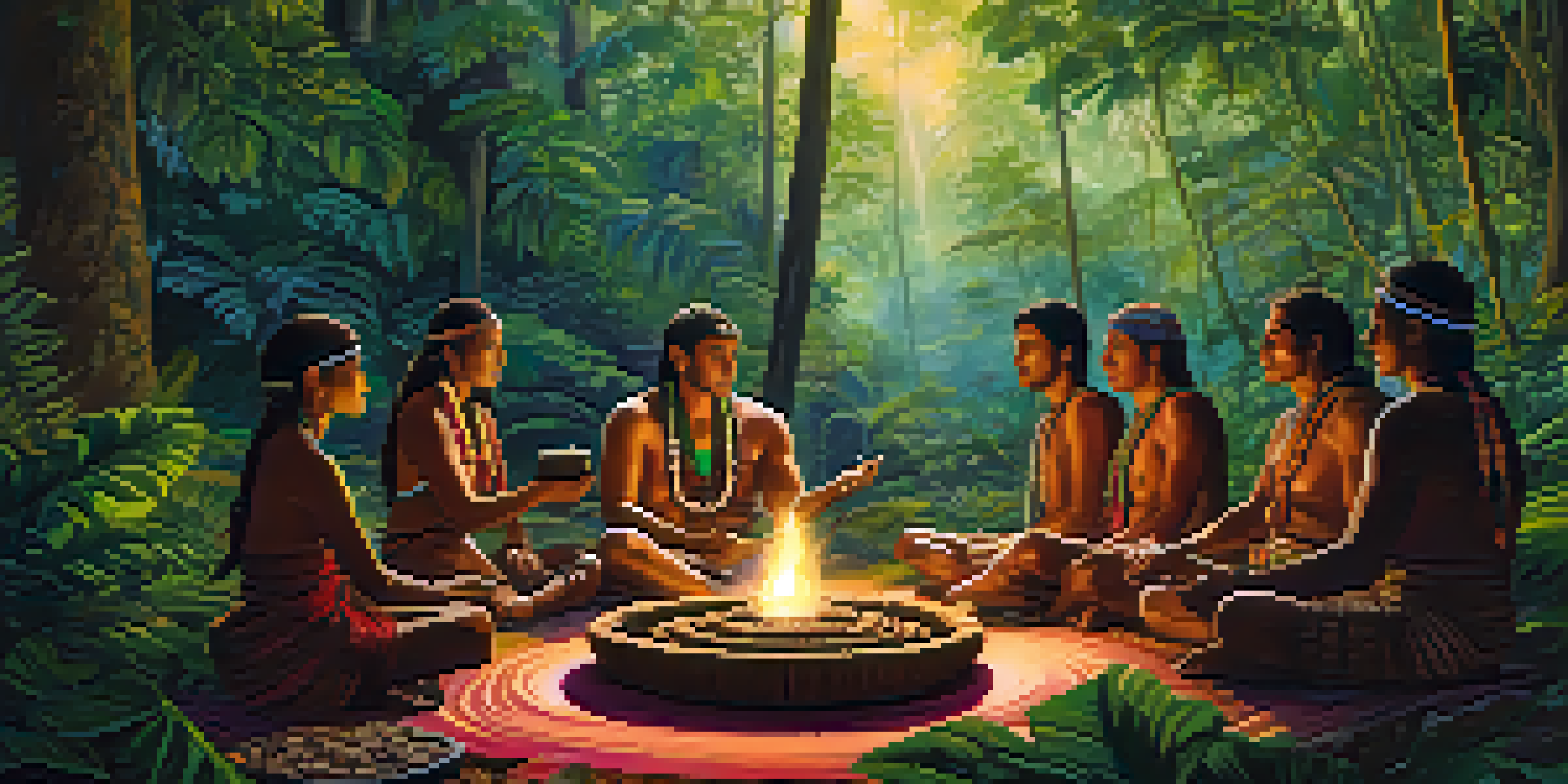Cultivating Resilience: The Ayahuasca Experience Explained

Understanding Ayahuasca and Its Cultural Significance
Ayahuasca is a traditional Amazonian brew made from the Banisteriopsis caapi vine and the Psychotria viridis leaf. This potent concoction has been used for centuries in indigenous rituals, serving as a spiritual tool for healing and self-discovery. Its cultural significance extends beyond mere consumption, as it embodies a deep connection to nature and the cosmos.
The wound is the place where the Light enters you.
In recent years, Ayahuasca has gained popularity beyond its native lands, attracting individuals seeking transformative experiences. Many participants report profound emotional and psychological insights during ceremonies, often guided by experienced shamans. This cross-cultural exchange has sparked interest in the therapeutic potential of Ayahuasca for mental health and personal growth.
As we delve into the Ayahuasca experience, it's essential to recognize its roots and the respect it commands within indigenous cultures. Understanding this context enhances our appreciation of its impact on resilience, revealing how ancient practices can inform modern self-care and healing journeys.
The Role of Resilience in Personal Growth
Resilience is the ability to bounce back from challenges and adversity, a vital trait that fosters personal growth. It allows individuals to navigate life's ups and downs with greater ease, learning valuable lessons along the way. Cultivating resilience often involves facing fears, overcoming obstacles, and embracing change.

In many ways, the Ayahuasca experience is a catalyst for building resilience. Participants often confront deep-seated emotions and traumas, prompting them to engage with their vulnerabilities. This process can be daunting, yet it ultimately equips individuals with the tools to handle future challenges more effectively.
Ayahuasca's Cultural Roots Matter
Understanding the cultural significance of Ayahuasca enhances appreciation for its healing potential and transformative experiences.
Moreover, resilience isn't just about enduring hardships; it's also about developing a positive outlook and adaptability. The Ayahuasca journey can help shift perspectives, allowing individuals to see setbacks as opportunities for growth rather than insurmountable barriers.
What to Expect During an Ayahuasca Ceremony
An Ayahuasca ceremony typically takes place in a safe, supportive environment, often led by an experienced shaman. Participants gather in a circle, where they prepare mentally and spiritually for the journey ahead. This communal aspect fosters a sense of belonging and shared experience, which can enhance the healing process.
What lies behind us and what lies before us are tiny matters compared to what lies within us.
During the ceremony, participants consume the brew and enter a deeply introspective state. Many report vivid visions, emotional releases, and a heightened sense of awareness. While the experience can be overwhelming for some, it often leads to profound insights and a deeper understanding of oneself.
It's important to approach the ceremony with an open mind and a willingness to surrender to the experience. Each person's journey is unique, and what unfolds can vary greatly. This unpredictability is part of what makes Ayahuasca so powerful in cultivating resilience and personal transformation.
Facing Fears and Emotional Blocks
One of the most significant aspects of the Ayahuasca experience is its ability to bring hidden fears and emotional blocks to the surface. Many participants find themselves confronting issues they've long avoided, whether it's past trauma, grief, or self-doubt. This confrontation can be intense, but it's often the first step toward healing.
Facing these fears during a ceremony can lead to cathartic releases, allowing individuals to process emotions that may have been suppressed for years. This emotional work is crucial for resilience, as it helps individuals understand their vulnerabilities and develop coping strategies. It’s like peeling away layers of an onion, revealing the core of who we are.
Resilience through Emotional Confrontation
The Ayahuasca experience encourages participants to face deep-seated fears, fostering resilience and personal growth.
Moreover, the insights gained from these experiences can empower participants to make positive changes in their lives. By acknowledging and addressing their fears, individuals can cultivate a newfound strength and resilience, enabling them to tackle future challenges with confidence.
The Connection Between Ayahuasca and Spiritual Growth
Ayahuasca is not just a tool for emotional healing; it also serves as a pathway to spiritual growth. Many participants report experiencing a profound sense of connection to something greater than themselves, whether it's nature, the universe, or a higher power. This spiritual aspect can be transformative, fostering a sense of purpose and meaning.
Engaging with the spiritual dimension of the Ayahuasca experience can deepen one's understanding of resilience. When individuals feel connected to a larger narrative, they often find strength in adversity, viewing challenges as part of their unique journey. This perspective shift can be incredibly empowering, helping them navigate life's ups and downs.
Additionally, spiritual growth can encourage a more compassionate and empathetic outlook. As individuals expand their awareness, they may develop greater resilience not just for themselves, but also for those around them, fostering a sense of community and support.
Integration: Applying Insights to Daily Life
The real work begins after the Ayahuasca ceremony, during the integration phase. This process involves reflecting on the insights gained and finding ways to apply them in everyday life. Integration is crucial for fostering lasting change and resilience, as it bridges the gap between the spiritual experience and practical living.
Many individuals find it helpful to journal, meditate, or engage in therapy during this phase. By articulating their experiences and feelings, they can better understand their journeys and create actionable steps for personal growth. This reflective practice is essential for maintaining the momentum gained during the ceremony.
Integration is Key to Lasting Change
Post-ceremony integration is essential for applying insights gained from Ayahuasca, ensuring meaningful personal development.
Moreover, sharing experiences with others who have undergone similar journeys can be invaluable. Support groups and community connections provide a safe space for discussion, reinforcement, and encouragement, further enhancing resilience and personal development.
The Potential Risks and Considerations
While the Ayahuasca experience can be profoundly healing, it's essential to approach it with caution. Potential risks include psychological distress, particularly for those with a history of mental health issues. It's crucial for individuals to consult with healthcare professionals before participating in a ceremony.
Additionally, the setting and guidance provided during the ceremony significantly influence the experience. Finding a reputable shaman and a safe environment is paramount to ensuring a positive journey. Just as you wouldn't jump into a pool without checking the water, it’s vital to do your research and prepare adequately.

Finally, it’s important to remember that Ayahuasca is not a cure-all. While it can facilitate significant breakthroughs, the real transformation occurs in the integration and application of insights gained. Cultivating resilience is a continuous journey, and Ayahuasca can be one of many tools along the way.